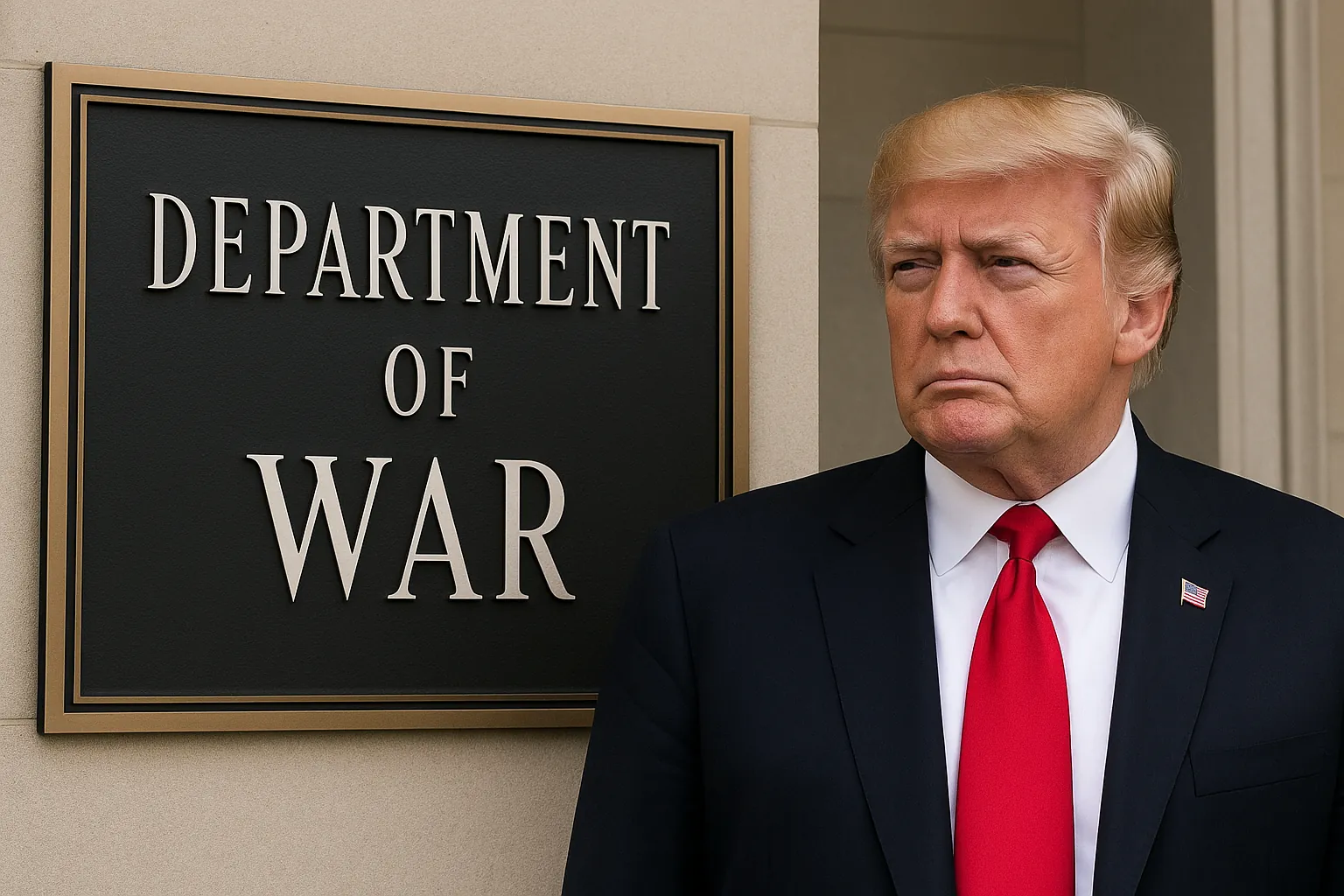Donald Trump has signed an executive order rebranding the Pentagon as the Department of War. This move, which sidesteps Congress by using the new name only as a secondary title, is more than a cosmetic adjustment. It is a deliberate rewriting of America’s military identity, a gesture packed with symbolism that raises questions about power, history, and Trump’s vision for the country.
Context: Pentagon renamed without Congress
The mainstream narrative frames the decision as merely symbolic. The Pentagon’s official name—Department of Defense—remains unchanged in law since 1947. To permanently alter it, Congress must act. Trump, impatient with legislative roadblocks, has instead directed agencies to adopt Department of War branding in websites and communications. Already, the Pentagon’s site redirects to war.gov.
Supporters argue this is harmless, even refreshing. They claim “Defense” never captured the victorious spirit of America’s wars, while “War” sounds more honest. Republican lawmakers have introduced bills to codify the name change. To them, it’s about restoring tradition.
Oppositional Argument: the dangerous nostalgia
But tradition is precisely the problem. Calling it the Department of War is not innocent symbolism. It is rhetorical militarization. Trump seeks to make aggression sound natural again. The Department of Defense implied protection, restraint, legitimacy. Department of War glorifies conquest.
The Pentagon is not just a building; it is America’s war machine. To rename it signals an intention: wars are no longer defensive but central to national identity. Nostalgia for a pre-1947 name masks a shift toward perpetual conflict.
Analytical Breakdown: causes and consequences
Trump thrives on symbolic power grabs. He knows executive orders can be struck down, but the headlines matter. By forcing journalists, generals, and even ordinary citizens to repeat “Department of War,” he shapes perception. Words precede policies.
History teaches us the danger of such rebranding. In 1917, Wilson’s “Committee on Public Information” sold the First World War as noble. In 2002, Bush’s renaming of “War Department” history into “Defense” was invoked to justify the invasion of Iraq. Each label was propaganda.
The consequence here is twofold. First, the United States risks normalizing permanent war footing. Second, it weakens democratic checks, because Congress is bypassed. If symbolism can be imposed by decree, substance follows.
Human Perspective: war branding and citizens
For ordinary Americans, the difference between “defense” and “war” is not abstract. Defense reassures; war intimidates. Imagine a soldier telling a grieving parent their child died in the name of “defense.” Now imagine that same explanation using “war.” Language shapes grief, honor, legitimacy.
Military families know this better than politicians. A rebranded Pentagon suggests their sacrifice is not about protecting home but about endless campaigns abroad. It shifts the moral ground beneath their lives.
Counterarguments
Some argue Trump’s executive order is toothless. They insist it is mere branding without legal force. That misses the point. Symbols are never neutral. Confederate statues were “just statues”—until they weren’t. Political language plants seeds that bloom into policy.
Others claim that reclaiming the term “War” brings honesty. But honesty without restraint is glorification. The Pentagon already fights wars; calling it “War” doesn’t clarify, it normalizes.
Conclusion: resisting symbolic militarism
This rebranding of the Pentagon as the Department of War is not just nostalgia, and not just symbolism. It is a calculated assertion of executive authority, bypassing Congress, and feeding Trump’s politics of strength. Americans must ask themselves: Do we want a government that names itself for peace, or for war?
Words matter. If we surrender language, policy will follow. This is not just Trump’s theater—it is the opening act of militarized governance. The opposition must resist it now, before “War” ceases to be a name and becomes the nation’s destiny.
